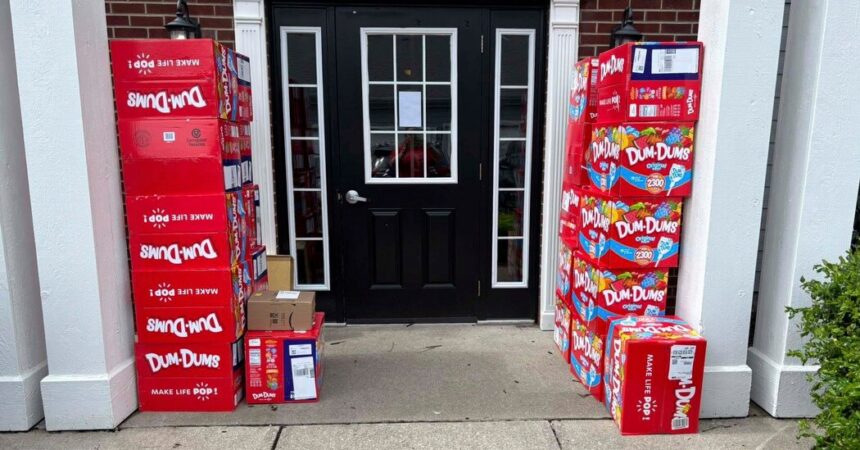A Mother’s Panic: 22 Boxes of Dum-Dums for Her Son’s Carnival
On Sunday morning, Holly LaFavers was preparing to go to church when a delivery worker dropped off a 25-pound box of lollipops in front of her apartment building in Lexington, Ky. Soon, 22 boxes of 50,600 Dum-Dums were stacked five high in two walls of her home.
Her son, Liam, 8, had gone outside to ride his scooter and exclaimed, "Mom, my suckers are here!" Ms. LaFavers, 46, panicked and became hysterical. She said Liam had become familiar with Amazon and other shopping sites during the pandemic, and she had occasionally let him browse the site if he kept the items in the cart.
However, over the weekend, Liam had a lollipop lapse. He told his mother he wanted to organize a carnival for his friends and mistakenly placed an order for almost 70,000 pieces of the candy instead of reserving it. The double ramparts of suckers rose on their doorstep, where the excesses of e-commerce crossed paths with their tight-knit community.
Ms. LaFavers discovered something was amiss after a shopping trip early on Sunday when she checked her bank balance online. "It was in the red," she said. The offending item was a $4,200 charge from Amazon for 30 boxes of Dum-Dums. Frantic and upset, she called Amazon, which advised her to reject the shipments. Ms. LaFavers was able to turn away eight of the boxes, totaling 18,400 lollipops, but the 22 boxes containing 50,600 lollipops had already landed.
"My Alexa didn’t even ding to tell me they had been delivered," she said. Ms. LaFavers said she was then told by Amazon that it could not take the candy back for a refund because it was food. So she tried to send back to the virtual shopping world what it had unloaded on her in the first place.
The post attracted the attention of local news stations and national media outlets, highlighting the financial treachery of online activity. Parents commiserated on her Facebook page and shared solutions, like detaching payment methods from online accounts, setting up alerts for large purchases or simply keeping children off phones. One child spent $980 on virtual Roblox game currency. A 3-year old playing on a phone during an airport delay spent $300 on movies. A woman’s granddaughter spent $1,000 on Google Play.
"Hi Everyone! Liam ordered 30 cases of Dum-Dums and Amazon will not let me return them. Sale: $130 box. Still sealed," she wrote on Facebook on May 4. "As a mom that has experienced unwanted orders, I feel your pain," a woman wrote.
Companies offer steps on how to prevent and dispute unauthorized purchases in online shopping and games. Roblox advises parents to use password-protected purchasing, and to call its customer service center before initiating a dispute with a payment provider, which would stall the refund process. Epic, the makers of Fortnite, has safeguards that include an "intent-to-buy" step, and purchase cancellations.
On Apple devices and accounts, family-verification settings include controls called Ask to Buy for a child’s device, or “don’t allow” for in-app purchases. Google Play’s purchase-verification process also has additional safeguards on family accounts that reverify the user is authorized to make a purchase on apps meant for children ages 12 and under.
Amazon eventually told Ms. LaFavers that it would give her a refund. In an email, the company said that it "worked directly" with her "to turn a sticky situation into something sweet." On Wednesday, after the refund came through, Ms. LaFavers decided to give away the Dum-Dums instead of selling them. One neighbor offered to distribute some on Halloween. A local chiropractor asked for two boxes, and a bank in Somerset, Ky., said they would take five boxes.
"I am giving them to the individuals that offered to buy them from me, or I am donating them to a charity or a school or church," Ms. LaFavers said. "People that I have relationships with were willing to buy those to help me out."
Spangler Candy Co., the company that has made Dum-Dums since 1924, invited Ms. LaFavers and Liam to visit its factory in Ohio. "We also love that so many people jumped in to offer to purchase the extra cases," said Kirk Vashaw, its chief executive, in an email.
Liam’s online browsing privileges are on pause. But Ms. LaFavers said he, too, had tried to find a way to recoup her money, telling his mother: "It’s OK, mom, we can sell my Pokémon cards."







